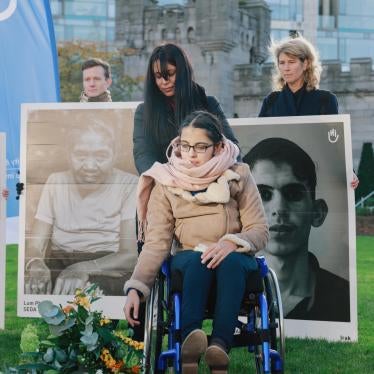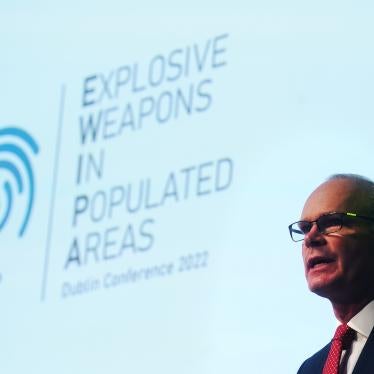Thank you.
To begin, we wish to express our gratitude to Ireland for its skillful leadership throughout this process, and to Austria for initiating international discussions of the topic in 2019. The political declaration on the use of explosive weapons in populated areas is a major milestone for humanitarian disarmament.
While the declaration calls for better compliance with international humanitarian law, it does much more. It commits endorsing states to take additional steps to advance humanitarian ends, notably “strengthening the protection of civilians” and “addressing the humanitarian consequences arising from armed conflict.” In other words, it commits states to adopt policies and practices to prevent and remediate harm caused by the use of explosive weapons in populated areas.
Having more than 70 states endorse this declaration is a moment to celebrate but it also marks the beginning of a new phase. States, international organizations, and civil society groups must now work in partnership to universalize, interpret, and implement the declaration.
The declaration delineates several steps that states should take to prevent the humanitarian consequences of the use of explosive weapons in populated areas.
As they engage in these efforts, states should understand their commitments in line with the declaration’s purpose to maximize civilian protection. In particular they should commit to “refrain from” the use of explosive weapons with wide area effects in populated areas, and “restrict” the use of all other explosive weapons in populated areas.
In addition, states should make clear that they will take into account the direct and indirect effects of the use of explosive weapons in populated areas when planning and executing attacks. It is well documented that the practice causes not only physical and psychological injury but also damage to infrastructure that interferes with basic services, harm to the environment, and displacement.
Addressing the humanitarian consequences of the use of explosive weapons demands robust victim assistance measures, another key element of the declaration. Assistance should be provided to affected individuals, families, and communities and take a variety of forms. It should be integrated, inclusive, and gender sensitive.
Data collection and sharing are essential to both preventing and remediating the harm caused by the use of explosive weapons in populated areas. A clearer understanding of effects can inform lessons learned, help identify what forms of victim assistance are needed, facilitate international cooperation and assistance, and promote monitoring and compliance.
States should make clear that they will collect and share operational data about weapons and targets as well as information about the range of effects of explosive weapons. Both are necessary to achieve the declaration’s goals. They should also work to ensure that data collection and sharing is feasible and presume it is appropriate unless it risks further harm.
Finally, states should live up to their commitment to engage in follow-up work on the declaration, including through regular meetings. Those meetings, which states should hold at least once every two years if not more often, are essential opportunities to share views on policies, practices, and interpretations of the declaration, provide updates on progress, share collected data, and promote implementation. Maintaining the inclusiveness that has characterized this process to date will add value to the discussions.
Congratulations on this humanitarian achievement. We look forward to working with you to realizing its potential.
Thank you.








